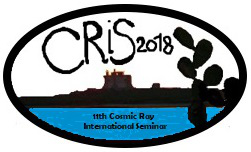Speaker
Giuseppina Fiorella Burgio
(CT)
Description
The equation of state (EoS) of nuclear matter is one of the key issues in understanding the internal structure of neutron stars (NS), the remnants of massive stellar collapses. They populate the plane of our Galaxy, isolated or in binary systems, and play a crucial role in the indirect (Hulse & Taylor 1975) and direct (Abbott et al. 2017a) testing of the existence of gravitational waves (GWs). Their physical properties (essentially the EoS) are still poorly known, owing to the lack of accurate measurements of masses and radii.
The detection of the 17 August event, GW170817, and its electromagnetic counterp arts allows to constrain the dense matter EoS. The upper limit put on the tidal deformability by the merger event, and the lower limit from the kilonova AT2017gfo signal, rule out respectively very stiff and very soft EoS. This translates into an allowed window for the radius of the 1.4Mo stellar configuration between∼11.5 and 13. 5km. This seems to contradict several analyses of X-ray NS spectra, which suggest radii significantly smaller than 11. 5 km (Oezel & Freire 2016). We show that it is possible to satisfy all the observational constraints on the radii if GW170817 is interpreted as the merger of a hadronic star and of a quark (or hybrid) star (Burgio et al.).
Abbott, B.P., et al. 2017a, PRL, 119, 161101
Burgio, G. F., Drago, A., Pagliara, G., Schulze, H.-J., and Wei, J., arXiv:1803.09696
Hulse, R.A. & Taylor, J.H. 1975, ApJ, 195, L51
Oezel, F., & Freire, P. 2016, ARA&A, 54, 401

